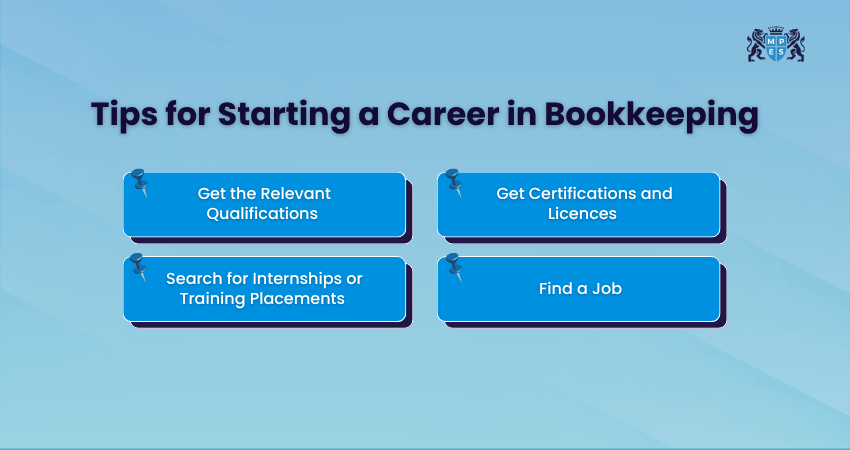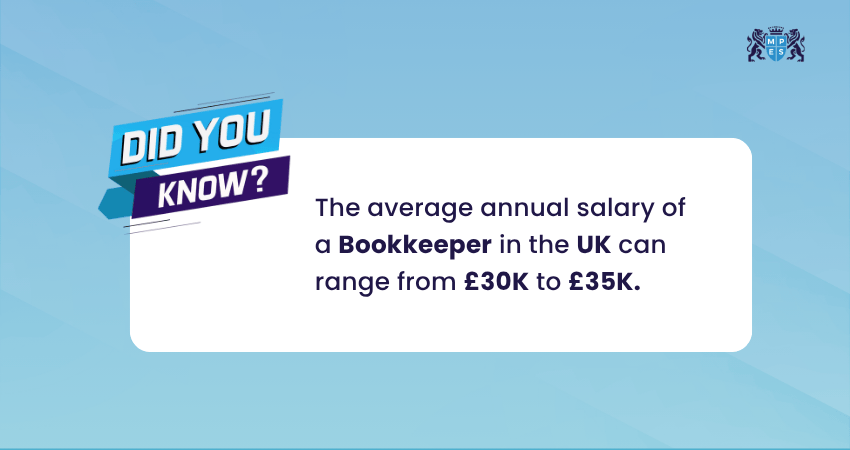Table Of Contents


If you are seeking to turn your love for numbers into a rewarding career, it's time to take the path of Bookkeeping. From tracking daily transactions to preparing vital financial reports, Bookkeepers are the heroes keeping businesses on track. But nowadays, Bookkeeping is more than just about ledgers. It's about leveraging modern tech and financial insight to power businesses forward like never before.
If you are looking for a detailed look into How to Become a Bookkeeper, this blog is good place to start. Learn about the Bookkeeping responsibilities, required skills, qualifications and more. So read on and make sure your skills for numbers truly count!
Table of Contents
1) What is a Bookkeeper?
2) What Does a Bookkeeper Do?
3) How to Become a Bookkeeper?
4) Required Skills for a Bookkeeper
5) Tips for Starting a Career in Bookkeeping
6) Conclusion
What is a Bookkeeper?
A Bookkeeper is a financial professional responsible for tracking an organisation’s cash flow. Their duties include recording purchases, expenses, sales, and invoices, as well as managing accounts payable and receivable. They ensure accuracy by reviewing financial records and reconciling them with bank statements.
Bookkeepers play a vital role across industries, working in schools, government bodies, accounting firms, and tax preparation services. Their work provides the foundation for Accountants to analyse data. In many ways, Bookkeepers help maintain financial stability and support informed decision-making.
What Does a Bookkeeper do?
A Bookkeeper keeps accurate financial records for a business. While most Bookkeepers work with companies, they can also be hired by individuals to manage personal finances. Their typical tasks include:
1) Recording Transactions: Every payment, sale or expense is logged and categorised. Bookkeepers may work from receipts, invoices or online bank feeds, often using apps to streamline and automate this process.
2) Reconciling Accounts: They routinely verify accounts against bank statements. This helps resolve discrepancies and maintain audit-ready financial records.
3) Managing Payroll: Bookkeepers process wages, deductions, and payroll taxes, ensuring employees are paid correctly and on time.
4) Preparing Financial Reports: To help business owners understand their performance, Bookkeepers compile reports such as balance sheets and cash flow statements.
How to Become a Bookkeeper?
If you’re interested in building a career in Bookkeeping, here are four key steps to follow:

1) Get the Relevant Qualifications
The first step is to gain the right qualifications. This will improve your skills and knowledge base and boost your job prospects. There are two main routes:
Earn a Degree: A degree in accounting, finance or Bookkeeping provides a solid foundation. It helps you build essential knowledge in areas like financial reporting, business principles, and data analysis. Entry requirements differ across institutions, so it’s best to review them before applying.
Learn Independently: Online courses are another pathway, allowing you to study at your own pace while covering essential Bookkeeping and accounting principles. Employers often look for candidates with some practical knowledge and software skills, so self-learning can help you stand out.
Mastering the language of business has never been smoother. Our Financial Accounting and Reporting (FARI) Training will show you how - Sign up now!
2) Search for Internships or Training Placements
Practical experience is key here. Internships or training placements will give you hands-on exposure and the chance to apply your knowledge in real-world situations. These opportunities can often be found on job sites, through recruitment agencies, or by contacting organisations directly.
3) Get Certifications and Licences
Once you have experience, professional certifications can amplify your credibility. Popular options include ACCA, ACA and CIMA Certifications. These credentials demonstrate professionalism and improve your employability.
4) Find a Job
Once you are armed with qualifications, experience and certifications, you’re ready to apply for Bookkeeping roles. Start with entry-level positions and work your way up to more senior roles. You can find opportunities through job boards, recruitment agencies, networking, etc. Alternatively, you may decide to go self-employed and establish your own Bookkeeping business.
Required Skills for a Bookkeeper
To succeed as a Bookkeeper, you’ll need to develop both technical and workplace skills. Technical skills are typically gained through education and training, while workplace skills are shaped by experience in professional and everyday settings.
1) Technical Bookkeeping Skills
Bookkeepers must have strong mathematical ability, computer literacy and proficiency in Bookkeeping software. Since practices vary by employer, it’s valuable to understand multiple Bookkeeping approaches. With the exponential rise of Machine Learning and Automation in finance, familiarity with such systems is vital. Additional technical skills include:
1) Invoicing
2) Basic Maths skills
3) Data Entry
4) Budget preparation
5) Financial Reporting
6) Knowledge of Accounting Software and spreadsheets (e.g., Excel)
7) General business awareness
2) Workplace Skills
Since Bookkeepers handle sensitive financial data, accuracy and integrity are of paramount importance. Attention to detail, honesty, and trustworthiness are non-negotiable qualities in this role. Here are some workplace skills to develop:
1) Clear communication
2) Strong organisation
3) Problem-solving ability
4) Effective Time Management
5) Collaboration and teamwork
6) Good memory retention
7) Adaptability
Juggle budgeting, forecasting and investing with ease. Sign up for our Financial Management (FM) Course now!
Tips for Starting a Career in Bookkeeping
Here are some proven tips to consider when planning your dream role as a Bookkeeper:
1) Determine Your Career Path
1) Bookkeepers can work across various industries with vast job opportunities.
2) You can choose roles with standard office hours and employee benefits.
3) Temporary contracts provide flexibility for short-term work.
4) Freelancing gives you the flexibility of setting your own work hours and pricing.
5) Analyse your goals to determine the ideal career path.
2) Build Practical Experience
1) Many employers prefer candidates with good Bookkeeping experience and accounting knowledge.
2) Gaining such experience gives you a competitive advantage when applying for roles.
3) You can build experience by completing a Bookkeeping apprenticeship.
4) Volunteering for a local charity to handle finance or Bookkeeping tasks is another option.
5) Unpaid work for a small business in accounting or Bookkeeping can also be valuable.

3) Learn Relevant Technical Skills
1) Bookkeepers rely on software and tools to manage financial records.
2) Learning tools like QuickBooks, Xero or Sage will improve your efficiency and employability.
3) Identify the software commonly used by your target organisations.
4) Focus on developing skills in those specific tools.
4) Explore Career Advancement Opportunities
1) Qualified Bookkeepers can progress into Accountant roles using their knowledge and experience.
2) Accountant positions offer a range of opportunities across industries and higher earning potential.
3) A degree-holder can pursue an accounting Certification for career advancement.
4) An accounting apprenticeship is another route to becoming an Accountant.
Conclusion
We hope this blog on How to Become a Bookkeeper has given you a clear understanding of the steps, skills, and qualifications needed to start your journey. With the right training and determination, you can build a stable and rewarding career in finance. Stay curious, keep learning, and let your passion for precision lead you toward long-term success in Bookkeeping. Remember, every great Accountant starts with mastering the art of accurate Bookkeeping.
Our ACA Certificate Level Training will add value to every aspect of your career. Sign up now!
 Have Any Question?
Have Any Question?
 +44 7452 122728
+44 7452 122728






 Back
Back








 44 7452 122728
44 7452 122728





